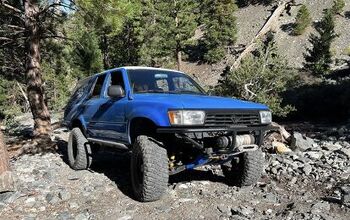Carlos Ghosn: Car Ownership Will Not Be Replaced With Mobility

Everyone in the automotive industry is talking about a grand shift toward mobility, resulting in a future where nobody owns cars and we all putt around in autonomous pods. Well, almost everyone. Carlos Ghosn, who currently chairs the alliance between Nissan, Renault, and Mitsubishi, thinks that’s a crock.
While there’s plenty of executives keeping quiet on the evolution of ownership, few have come forward suggest business as usual will be the new status quo. Meanwhile, swaths of industry experts are pushing the notion that rental services, ride-sharing, and firms like Uber or Lyft will eventually replace the need for dealerships and garages.
Not Carlos.
“A lot of people think this is substitution. It’s not — it’s addition,” Ghosn said in an interview with Bloomberg at its The Year Ahead conference. “The traditional business of building cars and selling cars and owning cars is going to continue.”
Take that, market analysts and mobility experts.
However, where cars will continue being sold is a little less reassuring. Ghosn said that, while markets like Japan, Europe, and the United States may have plateaued, there is plenty of room for growth in China and India. But he doesn’t believe mobility services will replace new car sales anywhere in the foreseeable future.
Obviously, tech firms pushing autonomous technology and ride-hailing services disagree. “Our view is that individual car ownership is something that will go away because it is very inefficient,” Jeff Holden, Uber’s chief product officer, said in a pervious interview with Bloomberg.
His claim is that, since the average car owner only uses their vehicle 4 percent of the time, ride sharing would be far more efficient — claiming those cars could be active 80 to 90 percent of the time. “When you get to those kinds of utilizations what you see happen is prices go way down,” he said. “So why would you own your own car? It’s just a hobby at that point. It just doesn’t make sense.”
I’ve thought a lot about these efficiency claims recently, and Uber’s pricing would have to dwindle massively to make it worthwhile in the long term. Let’s say you have a very reasonable commute distance of 26 miles to the office. Based on Uber’s current pricing structure, the most conservative estimate for that trip would be around $32 dollars. Let’s assume, for the sake of this argument, that autonomous driving halves that fee — saving us the need to calculate the return trip. That’s still $8,320 annually just to get a lift to and from work.
Ten years on, you’ve spent $83,200 for a car you don’t even own and didn’t use for anything but commuting. Granted, that’s some really soft math and doesn’t even take into account the additional money that goes into car ownership — like fuel, insurance, road tolls, and maintenance. But Uber would still have to scale back its pricing by an almost unfathomable percentage to make its service a preferable alternative to any individual that didn’t also have public transit as a secondary option.
As for the environmental impact, I would estimate that as negligible. Why would having one vehicle racking up miles and needing to be replaced sooner be better than having several that last over a decade apiece — especially when the shared vehicle mills around between trips, expending extra energy as it hunts for another passenger?
I’m beginning to see Ghosn’s point.
“The traditional business of building cars, selling cars, and owning cars is going to continue. I don’t think it’s going to stop,” he said. “You’re going to have the new business that develops around the car … For me, it’s an additional business. It’s not the substitution. It will have an impact on the normal car business but, in my opinion, it’s going to be marginal. And we, as car manufacturers, have to pay attention to the traditional business of doing cars but — at the same time — prepare for the new businesses that are going to develop through connectivity, autonomy, and mobility services.”
[Image: Nissan]

A staunch consumer advocate tracking industry trends and regulation. Before joining TTAC, Matt spent a decade working for marketing and research firms based in NYC. Clients included several of the world’s largest automakers, global tire brands, and aftermarket part suppliers. Dissatisfied with the corporate world and resentful of having to wear suits everyday, he pivoted to writing about cars. Since then, that man has become an ardent supporter of the right-to-repair movement, been interviewed on the auto industry by national radio broadcasts, driven more rental cars than anyone ever should, participated in amateur rallying events, and received the requisite minimum training as sanctioned by the SCCA. Handy with a wrench, Matt grew up surrounded by Detroit auto workers and managed to get a pizza delivery job before he was legally eligible. He later found himself driving box trucks through Manhattan, guaranteeing future sympathy for actual truckers. He continues to conduct research pertaining to the automotive sector as an independent contractor and has since moved back to his native Michigan, closer to where the cars are born. A contrarian, Matt claims to prefer understeer — stating that front and all-wheel drive vehicles cater best to his driving style.
More by Matt Posky
Latest Car Reviews
Read moreLatest Product Reviews
Read moreRecent Comments
- Dwford Will we ever actually have autonomous vehicles? Right now we have limited consumer grade systems that require constant human attention, or we have commercial grade systems that still rely on remote operators and teams of chase vehicles. Aside from Tesla's FSD, all these systems work only in certain cities or highway routes. A common problem still remains: the system's ability to see and react correctly to obstacles. Until that is solved, count me out. Yes, I could also react incorrectly, but at least the is me taking my fate into my own hands, instead of me screaming in terror as the autonomous vehicles rams me into a parked semi
- Sayahh I do not know how my car will respond to the trolley problem, but I will be held liable whatever it chooses to do or not do. When technology has reached Star Trek's Data's level of intelligence, I will trust it, so long as it has a moral/ethic/empathy chip/subroutine; I would not trust his brother Lore driving/controlling my car. Until then, I will drive it myself until I no longer can, at which time I will call a friend, a cab or a ride-share service.
- Daniel J Cx-5 lol. It's why we have one. I love hybrids but the engine in the RAV4 is just loud and obnoxious when it fires up.
- Oberkanone CX-5 diesel.
- Oberkanone Autonomous cars are afraid of us.


































Comments
Join the conversation
Yeah, as I keep saying...some of this stuff may mean some people decide to not buy cars, but if autonomy really happens, other people will be buying cars for their PETS(and children, elderly parents, have their own errand-running delivery truck, etc.)
The businesses that need to worry are parking lot owners and mass transit systems. Who is going to pay big money to have their self-driving cars sit around all day when they can send them home or out to work at Uber vehicles. Who is going to sit on a crowded bus or train when they can have a vehicle (whether owned or "rented") take them wherever they want to go much more efficiently and likely cheaply.